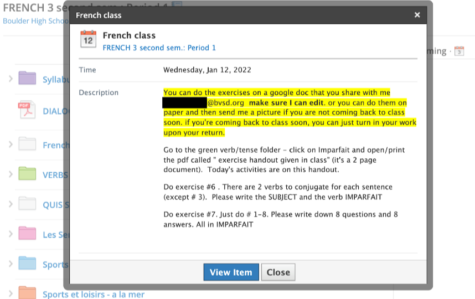Our Ableist Lack of Online Resources
Providing a Google Meet option for advisory would make it easier to catch up.
For years, disabled and chronically ill people have been asking for online options. Not all teachers post their daily work on Schoology or Google Classroom, so when a sick student is absent for months at a time, they have few resources to help them catch up. The system, therefore, discriminated against those who were prone to medical absences; it was ableist because it made things harder for people who weren’t perfectly healthy or able-bodied.
But why change the entire system for a small handful of students? The truth is that it’s not a small handful. Nearly half of all Americans suffer from chronic illness. One out of every fifteen have some sort of autoimmune disease, and younger people are disproportionately affected. In a survey of Boulder High students, 24.5% of respondents said they were immunocompromised, and though it’s important to acknowledge that this survey was specifically directed at the disabled, it’s still a startlingly high number, far more common than you’d think.
During the pandemic, virtual learning provided a brief respite because all the documents were online. Teachers linked their daily agendas, kept calendars, and attached materials. In Advisory, they set up a Google Meet. Everyone was on equal footing. Though of course it was a step in the right direction, there’s no denying it came about only because it was essential for able-bodied people, who finally found themselves in a situation where web resources were their only option. The increase in online info had nothing to do with the years worth of pleading by the disabled; if the pandemic hadn’t hit, their needs would have been ignored like they always were.
Now we’ve returned to in-person classes, and though many teachers preserved their well-kept Schoologys, others took the opportunity to get as far away from online learning as possible. Agendas and calendars are gone. If you miss a day, you can’t consistently find the make-up work. Advisory isn’t available as a Google Meet.

For immunodeficient and chronically ill people, it’s a disappointing return to the old ways, even more bitter because it shows the disparities in who is actually getting priority. These resources, so important for disabled individuals, are no longer necessary for abled individuals, so they’re disappearing. They’re seen as inconvenient to maintain, so teachers are stripping away what would otherwise be a wealth of helpful materials.
Now, with the sharp increase of the omicron variant, the cracks in the system are starting to show. When a student gets Covid, they could be gone for over a week, able-bodied or not; in some subjects, they’re left without resources, unable to do make-up work. Hybridized learning was incredibly hard on teachers, and there’s no such thing as a perfect solution, but would it be too much to ask for daily plans on Google Classroom or an open Meet during Advisory? The voices of the disabled are being ignored once again.
But how does this apply to BHS? In the survey mentioned earlier, 67.3% of respondents said they’ve had to choose between their health and their education, immunocompromised or not. For those with chronic illnesses, the number increases to a staggering 83.3%. Similarly, 50.0% claimed their teachers do not post resources online. “[They’re] often unempathetic to [those] who miss school even if they were sick or have rough home lives,” one student asserted. “It’s exhausting to keep up with unreliable teachers, excessive homework, and my rocky home life, as well as being responsible for my own mental health issues.”
BVSD does have an online school, Boulder Universal, but it’s a problem for the same reason virtual learning started to wear after a year. It didn’t work for everyone, and though some thrived in their Zoom classes, others saw a decline in their grades or their mental wellbeing. It’s unfair to ask immunocompromised people to sacrifice their social life or their real education just because of their health; sure, it would be safer, but it forces them to change their entire situation, which many protested when it happened to them. Is it more reasonable to pressure a whole group into online learning rather than write up a report of the day’s activities or link the weekly worksheets?
But do web materials really fix the issue? According to students, the lack of online support is just the tip of the iceberg. One respondent, who wishes to remain anonymous, mentioned that even when everything is accessible on Schoology, “teachers use online resources as an excuse to not accommodate [students] because the resources are online and available.” Éowyn P., ‘22, elaborates from their own experience. “I feel what some teachers don’t understand is that if I miss a day because I’m super sick, I’m not sitting at home doing my homework. I’m resting and doing what I need to do to get well.” When students are absent because they’re too sick to do the work, the existence of online resources does not justify leaving them without help. They’re an important first step, but they’re not enough. We as a community need to change our mindset, learning to support those with chronic illnesses even when it requires a little extra effort.
Another problem is the attitude we have towards absences. “I think there is a stigma that you can’t be a good student if you miss a lot of school, and some teachers have been hesitant to accept my 504 plan because they feel that because I am a good student, I shouldn’t need one,” Éowyn mentioned. “I wish that the system didn’t punish students for getting work in late due to illness, especially chronic illness… Just because I’m sick a lot doesn’t make me less intelligent or less capable of learning. I just need a little more patience than the average student.”
The virus doesn’t discriminate. It doesn’t impact those with disabilities at a higher rate than those without. But it often hits harder. For people with autoimmune diseases, Covid can be fatal. To get an education, students are risking their lives. It’s time to stop ignoring the needs of the disabled and finally improve both our online resources and how we treat those who miss school.

A senior at Boulder High, Tia developed her interest in journalism when she joined the newspaper club as a freshman. Over the course of her life, she’s cultivated a deep love of writing as an outlet and a stress-reliever, which lead her to participate in multiple literary classes, from Mythology to Creative Writing and finally, in her last year, Newspaper 1. In terms of her articles, she does not intend to focus on any particular topic but hopes she will be able to bring a fresh perspective to the paper.
Tia’s hobbies include hiking, kayaking, and reading, preferably while sitting on her porch. She is a volunteer at the Humane Society and spends two hours a week taking care...


